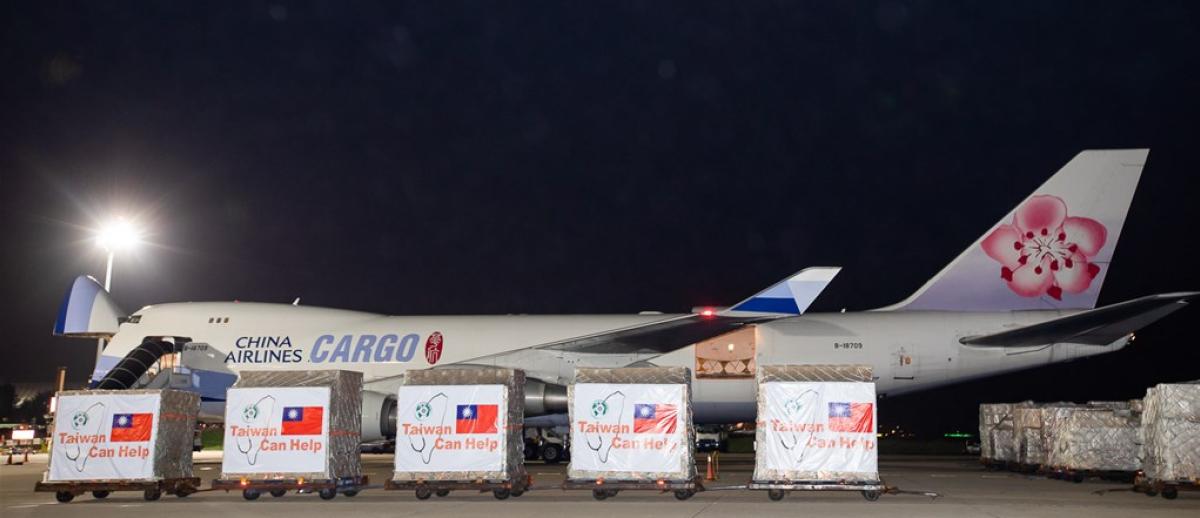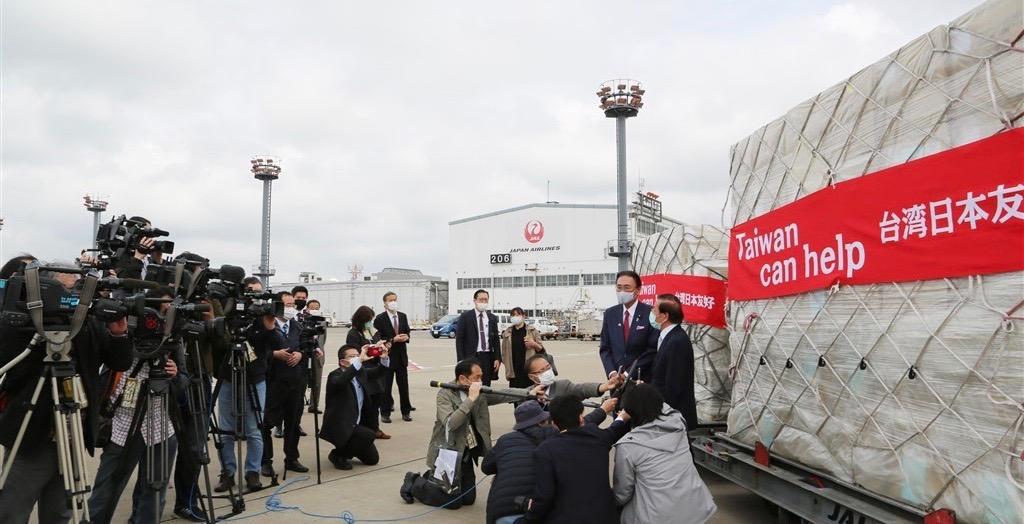#TaiwanCanHelp: Riding vs. Confronting the COVID-19 Crisis in Taiwan
archive


A photo from the Taiwan Ministry of Foreign Affairs' Twitter page shows several palettes of face masks in front of China Airlines Cargo 747.
#TaiwanCanHelp: Riding vs. Confronting the COVID-19 Crisis in Taiwan
Quarantine, travel restrictions, border shutdowns: on all levels, border control measures have been imposed in countries around the world during the past three months. While a third of the global population is on coronavirus lockdown, Taiwan—along with Hong Kong and Singapore—stands out with its relatively few cases of infection in marked contrast to previous estimates by experts and despite its close connection and proximity to China. With masks on, most Taiwanese seemingly carry out their daily business as usual, increasingly enjoying a sense of pride for being meticulously taken care of by the state and seeing Taiwan praised in international media as a model for confronting COVID-19. Moreover, the #TaiwanCanHelp campaign, initiated by president Tsai Ing-wen, has drawn worldwide praise for its contribution to global health, and is expected to help Taiwan reduce its isolation in international affairs.
Yet, the campaign has attracted backlash as well as recognition. WHO Secretary Tedros’s recent emotional complaints against “Taiwan” for making defamatory racist comments about him is one extreme episode that exposes the geopolitical fault lines under the pandemic crisis. In another, China has accused Taiwan of using the COVID-19 crisis to seek independence. A full-page ad in the New York Times sponsored by a crowdfunding campaign by young Taiwanese Youtubers and designers responded to this accusation, exemplifying Taiwanese determination to raise its standing in the world. The complexity of desire and anxiety beneath the increased sense of complacency in Taiwan in the midst of coronavirus pandemic is the focus of the present essay, which reflects on how it may bring more uncertainty to the island state’s effort to promote medical diplomacy and counter the virus’s spread. The pandemic has brought new rays of hope to Taiwan but, at the same time, drawn it into a whirlpool of diplomatic drama, especially as regards its newly strained relationship with China.
As of May 7, 2020, Taiwan has confirmed only 439 cases of COVID-19 and six deaths. How Taiwan was able to maintain this level of virus spread control has attracted international media interest. Starting from March 2020, academic colleagues from the global North have asked me, what is it like in Taiwan these days under the COVID-19 pandemic? Most of them are surprised to hear that universities are operating as usual and that I, as a teacher, have been working regularly, with childcare support continuously provided by the nursery near campus. We have been enjoying relatively high freedom of movement and maintaining “business as usual” when compared to other places in and beyond Asia. This has all been considered an achievement of the current Taiwan government under Tsai’s administration, which was able to act quickly to stop the entry of mainland Chinese, retain sufficient PPE (personal protection equipment) within Taiwan, and direct citizens to take necessary hygiene measures.
As early as January 24, the Taiwanese government stepped in to stop mask exports and has worked with companies to increase mask production capacity. In early March, a state project to set up 60 new production lines in a month was accomplished and daily mask production reached more than 10 million. Starting on March 12, every Taiwanese could pre-order their weekly ration (9 pieces bi-weekly) of surgical face masks online through the National Health Insurance Administration’s (NHIA) cellphone app. This has saved Taiwanese from having to queue up for masks at stores and fervently search for online mask deliveries. Since late March, Taiwan’s success stories have been reported by a number of international media.1
Debates over “mask diplomacy” began on April 7, when the government announced its intention to send more than sixteen million masks overseas, including to the US, Europe, Japan, Singapore, and Vietnam, which soon stirred upidentity politics between Taiwan and China. While China has all along made similar efforts to distribute masks, its media lost no time in criticizing Taiwan’s mask diplomacy and framed it as a challenge to China’s sovereignty and supremacy, denouncing Taiwan’s acts for instrumentalizing the COVID-19 crisis in order to further the objectives of pro-independence groups.
On April 16, President Tsai published a Time magazine essay titled, “President of Taiwan: How My Country Prevented a Major Outbreak of COVID-19.” The piece emphasizes that “Taiwan is no stranger to hardship, and our resilience stems from our willingness to unite to surmount even the toughest obstacles,” thus playing on a metaphor relating public health to political survival. In the same month, Taiwan’s Vice President Chen Chien-jen—who is also a renowned epidemiologist—was invited to the Johns Hopkins Bloomberg School of Public Health to share insights about Taiwan’s strategies for fighting the pandemic.2
[Chinese] media lost no time in criticizing Taiwan’s mask diplomacy and framed it as a challenge to China’s sovereignty and supremacy...
On April 16, President Tsai published a Time magazine essay titled, “President of Taiwan: How My Country Prevented a Major Outbreak of COVID-19.” The piece emphasizes that “Taiwan is no stranger to hardship, and our resilience stems from our willingness to unite to surmount even the toughest obstacles,” thus playing on a metaphor relating public health to political survival. In the same month, Taiwan’s Vice President Chen Chien-jen—who is also a renowned epidemiologist—was invited to the Johns Hopkins Bloomberg School of Public Health to share insights about Taiwan’s strategies for fighting the pandemic.2
But the international glamour that Taiwan enjoyed lately has at the same time fueled internal identity and political tensions, in part brought about by the manner in which the country’s mask diplomacy has been presented to its citizens. As a part of its online PR through social media, the Taiwanese government has endeavored to show people how Taiwan-produced masks were sent to different countries around the world to save lives, sharing photos and videos on its Facebook page of how boxes of medical supplies were shipped and delivered aboard planes emblazoned with “China Airlines,” the name of Taiwan’s national air carrier. The video clips angered many people in Taiwan and elicited a call for changing the name of Taiwan's largest carrier on the grounds that it could easily be mistaken with the airline Air China of the People’s Republic of China. These critics worried that the PRC would get credit for the humanitarian efforts of the Taiwanese. On the other hand, some pro-China Taiwanese saw criticism as another aggressive way to politicize the humanitarian mask donations and insisted that the name should not be changed. It was reported that the company has started internal discussions and research on this question “with an open attitude.”3 This debate has unexpectedly re-opened “healed” wounds regarding Taiwan’s identity, reviving internal splits deeply rooted in national politics and echoing the de-sinicization campaign of the 2000s.4
Mask diplomacy was taken to another level in late April when Chen Shih-chung, Taiwanese Minister of Health, announced that the NHIA cellphone app would allow users to donate their ration of masks to countries in need.5 The policy facilitates the participation of all Taiwanese in mask diplomacy, and within three days the donations reached over one million masks. Many Taiwanese have expressed their pride in joining with the government to contribute to global public health.

Media coverage of two million surgical masks donated by Taiwan to Japan arriving in Tokyo on April 21, 2020. (Photo: The Central News Agency, Taiwan)
Indeed, the campaign of combating COVID-19 involves every Taiwanese in a collective learning process about utilizing, producing, and distributing masks but it also entails various discussions on legality, citizenship, and hygiene nationalism. With lessons learned from SARs, and a long-established sense of “hygiene modernity” inherited from colonial memories, both the state and people of Taiwan are eager to demonstrate to the world that wearing masks is a successful strategy for containing the pandemic and that Taiwanese therefore have the luxury of donating masks to their foreign friends. Every donation via the cellphone app appears as a ritual practice that reaffirms the success of #TaiwanCanHelp, raising Taiwanese national pride.
In addition, the fact that Taiwan is the only place where baseball and soccer games have continued to be played during the pandemic has unexpectedly attracted international sports fans to follow the live broadcasts online. It might be considered another example of #TaiwanCanHelp. The Chinese Professional Baseball League (CPBL) became the first professional league in the world to start its 2020 baseball season, opening on April 12 and attracting global baseball fans, especially from the US.6 This, too, has added to the confidence of Taiwanese society. Yet, the word “Chinese” in the league’s name, mirrors the same problem with Taiwan’s official name as the Republic of China (ROC), again sowing confusion and exposing the ambivalence of the island’s status of de facto sovereignty without a clear national identity.
Every donation via the cellphone app appears as a ritual practice that reaffirms the success of #TaiwanCanHelp, raising Taiwanese national pride.
While mask diplomacy has strongly showcased Taiwan’s soft power abroad, it has also brought about a worrisome complacency and an antagonistic form of patriotism. Many have become so content with the government and its achievements that they resist any criticism of the current administration. Some Taiwanese netizens have become intolerant toward anyone criticizing the government (be they Taiwanese or foreigners). This emphasis on “cooperation” (with the state) rather than reflection or self-criticism has made even minor criticisms seem politically incorrect. It has furthermore fueled transnational tensions among netizens. For example, Ho Ching, the wife of the Singapore Prime Minister,7 was ruthlessly attacked by many young, energetic, and nationalistic Taiwanese for appearing to dismiss Taiwan’s success with the pandemic in a Facebook post. Some online discussions that simmer alongside mask diplomacy have been aggressive and offensive, rendering Taiwanese netizens no different from the patriotic ‘tankies’ of mainland China.
The early relaxation of COVID-19 measures and the kind of “pride and prejudices” exhibited by Taiwanese patriots foretell border-crossing caveats at the overlapping fault lines of patriotism, health diplomacy, international politics, and China’s hegemonic discourses. The coronavirus war has not yet ended. Taiwan should never underestimate the risk of similar outbreaks occurring in other places, and should learn from the errors of putting blame on the racial “other” that are occurring elsewhere. Going forward, an important task for #TaiwanCanHelp is to remain actively and positively engaged in the global battle against the pandemic while also managing the complex anxieties and desires evoked by the uncertain political future of the island.
1. Examples include “With Odds Against It, Taiwan Keeps Coronavirus Corralled,” NPR, March 13, 2020:https://www.npr.org/sections/goatsandsoda/2020/03/13/814709530/with-odds-against-it-taiwan-keeps-coronavirus-corralled and How Taiwan is containing coronavirus – despite diplomatic isolation by China (13 March 2020) on the Guardian. https://www.theguardian.com/world/2020/mar/13/how-taiwan-is-containing-coronavirus-despite-diplomatic-isolation-by-china
2. See more about the event at https://www.jhsph.edu/covid-19/events/april-24.html?fbclid=IwAR0S6EhKQjWiTb7hDdGP_geObPrwBvsbhW_-RsG_0y1bnjxD1kYg3SkBG1w
3. Karla Cripps and Shawn Deng, “Taiwan’s largest airline considers a name change,” CNN, April 15, 2020: https://edition.cnn.com/travel/article/china-airlines-taiwan-name-change/index.html
4. How to legally position Taiwan has remained a debate. Before the Japanese colonization the island had never been fully ruled by any single country. Japan ceded its 50-year rule over Taiwan under the San Francisco Peace Treaty after World War Two and then Republic of China took over Taiwan with American support. Soon after 1949 the Chiang Kai-Shek administration fled Mainland China and came to the island and since then Taipei has been the capital city of Republic of China. Though PRC has seen the island part of its territory, it has never set foot in Taiwan. For the past seven decades there are two “Chinas” across the Taiwan straits that easily confuse those who are not familiar with the geopolitics of East Asia. Increasingly, the younger generation prefers to identify the island as “democratic Taiwan” rather than “free China” today. See more in Rigger, S. (2011). Why Taiwan matters: Small island, global powerhouse. Lanham, Md: Rowman & Little field.
5. See more at https://en.rti.org.tw/news/view/id/2003152
6. Jorge Castillo. “Professional baseball in Taiwan has begun in empty stadiums.” Los Angeles Times, April 16, 2020:
https://www.latimes.com/sports/story/2020-04-16/professional-baseball-in-taiwan-begins-empty-stadiums-ariel-miranda
7. See more at https://sg.news.yahoo.com/ho-ching-sort-thanks-taiwan-110326635.html



